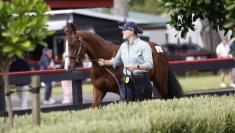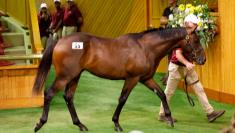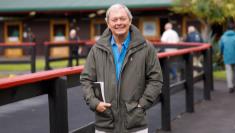.jpg)
NZB pitches sale bubble proposal to Govt
The completion of the DoubleTree By Hilton Karaka hotel couldn’t come at a better time for New Zealand Bloodstock.
Located at their Karaka sales complex, the hotel is set to open in February next year, just weeks before the delayed New Zealand Bloodstock National Yearling Sale Series, which will run from March 7-12.
While New Zealand citizens will be able to return home for the sale from mid-January after a seven-day home isolation period, fully vaccinated foreigners won’t be able to enter the country until April 30 under the Government’s current border plan.
As a result, overseas buyers would once again be absent from the Karaka sales complex at next year’s sale, however, New Zealand Bloodstock have gone to the New Zealand Government with a proposal that could change that, with the utilisation of their newly-opened hotel the main drawcard.
“We are in a great position here at Karaka,” New Zealand Bloodstock Managing Director Andrew Seabrook said.
“On our 140-acre property we have a hotel, the DoubleTree By Hilton Karaka, which opens in February.
“It is only a couple of hundred metres stroll across the grounds to the sales complex.
“We have put a very viable and risk-free proposal to Hon. Grant Robertson, the Deputy Prime Minister and Racing Minister.
“We have 122 rooms, so we are proposing to fly in up to 122 Australian buyers over to New Zealand and we pick them up at the airport and bring them to the hotel here on site, which would be closed to the public.
“They would be in their own bubble, not too dissimilar to what various sports teams have been doing around the world.
“We would have security guards at the gates and they wouldn’t go off site. They don’t need to come in contact with the community. They have everything in the bubble - they can eat here, sleep here, and do their job here of looking at horses and buying them.”
On New Zealand Bloodstock’s large sales complex, Seabrook said social distancing between foreign and domestic buyers would be easily achievable.
“Putting them in their own bubble is pretty easy (at the sale), it is a big auditorium, and we can put aside a section for them to operate from,” Seabrook said.
“Looking at the horses, they don’t have to come in contact with the handlers, so that is risk free.”
Seabrook said the sale was a big contributor to the New Zealand economy and many Kiwis rely on the sale as a source of income.
“This is not just a sporting event or concert, this is a massive economic event for the Auckland and New Zealand economies,” Seabrook said.
“For most breeders it is their one chance of the year to earn their income. We are talking about livelihoods here.
“I think that we have come up with a decent proposal that will hopefully be thoroughly considered.”
While hopeful of a positive outcome, Seabrook said the sales environment has been able to adapt to the challenging situation caused by COVID-19 over the last 18 months, and he is confident buyers will continue to support the sale remotely.
“The sales have come a long way in the last 12 months,” Seabrook said. “People’s appetite to buy online and remotely has been fantastic, as we saw at Te Rapa (NZB Ready to Run Sale) a few weeks ago.
“But the Australians are very keen to get here, so we would love to get them here and capitalise on the wonderful results New Zealand horses have had over the last 12 months.
“But if it (proposal) is turned down and we can’t make it happen, we are still looking forward to a successful Karaka 2022.”
If the Government turns down New Zealand Bloodstock’s proposal, Seabrook said Australian-based New Zealand citizens, including trainers and agents, of which there are several, will still be able to attend after undergoing a seven-day home isolation.









